By Eve Bourbeau-Allard and Julie Herrada
Preserving the history of labor movements has been core to the Labadie Collection’s mission since its very beginnings more than a century ago. In 2016, two important collections on 20th century labor organizing have been arranged to better facilitate research. The Joyce Kornbluh Collection (3.25 linear ft.) and the Don Stewart IWW Collection (3 linear ft.) conserve evidence of the regular confrontations between workers, corporations, and government throughout the past hundred years.
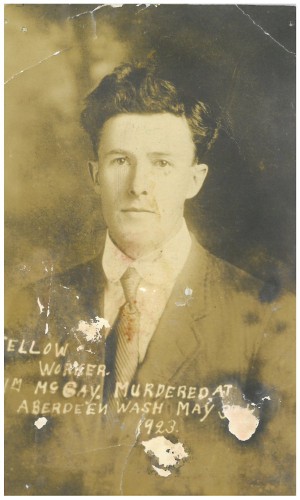
Photograph of “Fellow Worker Wm. McGay, Murdered at Aberdeen Wash on May 3[?] 1923” from the Don Stewart IWW Collection. Lumber strikes arose across the Pacific Northwest in the early 20th century, leading to violent confrontations.
The Joyce Kornbluh Collection centers on the history of labor education. Kornbluh (b. 1928) is a labor educator, author, and activist based in Ann Arbor, MI. Her Rebel Voices: An IWW Anthology (1964) remains a seminal work for labor historians, collectors and activists. Kornbluh used the Labadie Collection’s source materials extensively in writing the book. In 2003 the Michigan Women’s Hall of Fame honored her achievements to the cause of labor. Kornbluh dedicated much of her career and advocacy efforts to advancing the condition of women workers and to fostering educational opportunities for workers. In the 1970s, Kornbluh joined the University of Michigan Labor Studies Center, where she founded the Program on Women and Work in 1974 and, later, the Michigan Summer School for Women Workers.
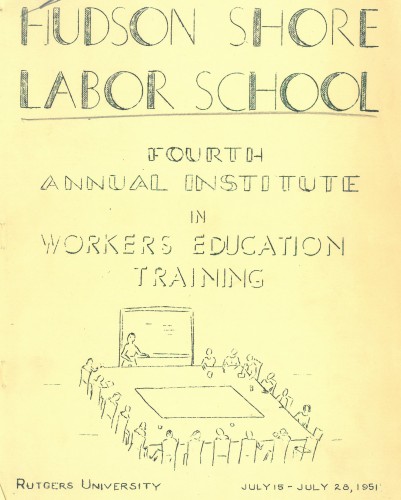
Cover page of the 1951 annual institute of the Hudson Shore Labor School handbook. From the Joyce Kornbluh Collection.
Reflecting her career’s trajectory, Kornbluh’s collection includes about 1 linear foot of programs, yearbooks, and reports issued by labor schools across the United States from the 1920s to the 1950s. Kornbluh also preserved valuable records of the short-lived Workers’ Education Service that offered classes from 1944 to 1949 at the University of Michigan. In the political climate of the Red Scare, workers’ education was a controversial endeavor. Of particular interest among the materials donated by Kornbluh is a series of reports and letters documenting the suspension of the Workers’ Education Service after an employee of the General Motors Corporation accused the program of teaching Marxist propaganda and distributing union pamphlets. This caught the attention of politicians and of the University administration. Attempts to negotiate over what would constitute appropriate course content failed, and the service to workers was discontinued.
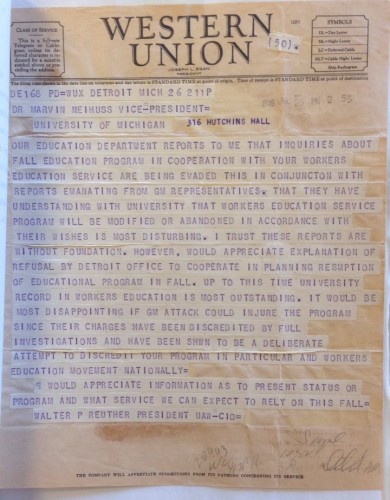
Telegram from United Automobile Workers leader Walter P. Reuther, included in the appendices of the Provost’s report to the University of Michigan Board of Regents regarding the Workers’ Education Service controversy. From the Joyce Kornbluh Collection.
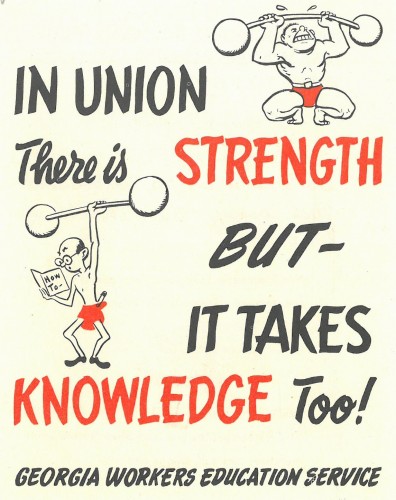
Pamphlet from the Georgia Workers Education Service collected by Joyce Kornbluh.
As this pamphlet suggests, if unions relied on knowledge, they also relied on strength - strength in numbers. In the early twentieth century, the founding of the Industrial Workers of the World (IWW) with its aspiration to bring all workers under “one big union”marked a pivotal moment in labor organizing. Owner of the iconic Vancouver bookstore MacLeod’s Books since 1973, Don Stewart has long maintained an interest in labor history. Stewart assembled a significant set of organizational records and promotional literature from the IWW that has been acquired by the Labadie Collection.
Records of the IWW General Executive Board administration for the years 1959 to 1964, and minutes from the general conventions for the years 1913 to 1969 (with gaps) represent important segments of the collection. They allow a glimpse into the debates and ideas that animated the union’s leadership.
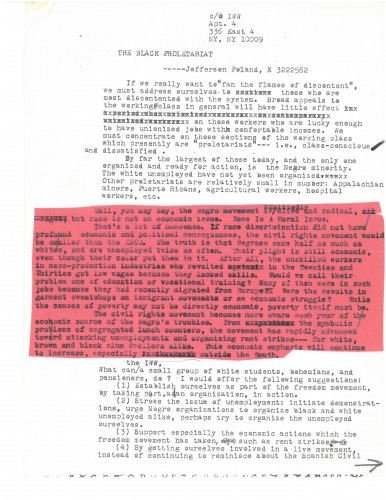
Letter to the General Executive Board titled “The Black Proletariat” with proposals regarding the civil rights movements. Circa 1960s, from the Don Stewart IWW Collection.
Materials from several of the constituent industrial unions, such as the Agricultural Workers Industrial Union (no. 110) and the Lumber Workers Industrial Union (no. 120), as well as from the Western Federation of Miners, feature in the collection. Relating to the history of mine workers, Don Stewart also gathered a set of letters, telegrams between labor organizers, bulletins to workers, and other documents chronicling the Columbine coal mine strike and massacre of 1927. This archive on the confrontation between strikers and police in Colorado that killed six coal miners complements the collection on the Everett Massacre of 1916 already among the Labadie’s holdings.
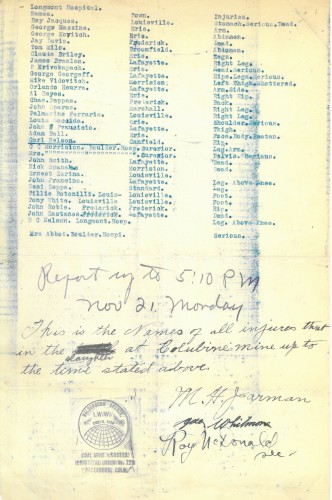
Report of casualties at the Columbine Mine as of 5:30pm the day of the massacre, Nov. 21, 1927. It lists 32 miners, their hometown, and the nature of their wounds. Two more would die of their wounds later. From the Don Stewart IWW Collection.